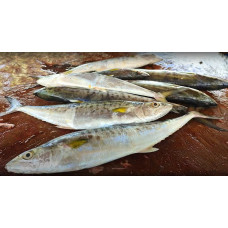Latin name
Scomberomorus guttatus
Other names
Spotted seer fish, spotted Spanish mackerel
Identification
They have an elongated, spindle-shaped body with a thin caudal stem with simple keel. Teeth are knife-shaped. The head is short. The length of the snout is shorter than the rest of the head. Canines and premolars are present. The maxilla is not hidden under the premaxilla. The lateral line is not wavy, but curves sharply under the second dorsal fin. The ventral dorsal fin is small and forked. Teeth on tongue absent. Swim bladder absent. The lateral line has several branches. The body height is smaller compared to the Korean mackerel, 22.8-25.2% of the length to the tail fork, compared to 24.4-26.7%. The head is also larger, 20.2-21.5% versus 19.7-20.4%. The number of gill stamens on the first gill arch is 8-14. The vertebrae are 47-52.
Features of fish fins
The 2 dorsal fins are separated by a small gap. The pelvic fins are small. The first dorsal fin has 15-18 barb rays, the second dorsal fin has 18-24 barb rays, and the anal fin has 19-23 soft rays. Behind the second dorsal and anal fins is a row of 7-10 smaller fins that help to avoid vortex formation during rapid movement. Small pectoral fins are made up of 20-23 rays.
Fish colouring
Back dark. The sides are silvery with several rows of nearly circular spots. The anterior half of the first dorsal fin is black, the posterior third of the fin is white at the base. The second dorsal, pectoral and caudal fins are dark brown, the pelvic and anal fins are silvery white.
Distribution
They live in the coastal waters of the Indian and Pacific Oceans, in the Indo-Malay Archipelago up to the islands of Java and Sulawesi, in the southern part of the Sea of Japan, in the Persian Gulf.
Habitat
These tropical pelagic neretic fish are found at depths from 15 to 200 meters, usually between 20 and 90 meters. They occasionally enter murky estuarine waters.
Size
Maximum registered length 76 cm. Normal length 55 cm.
Behavior
Migrates seasonally, but to a lesser extent than the narrow-bodied Spanish mackerel. A gregarious fish found mainly in coastal waters.
Food and feeding habits
They feed mainly on small fish, but also on cephalopods and crustaceans.
Reproduction
The spawning season is long. In the Indian Ocean off the coast of Madras, spawning occurs from July to January, and in the Palk Strait between India and Sri Lanka from April to July. The eggs are about 1.2 mm in diameter, the yolk is unsegmented, and the fat droplet is large. The larvae are 2.8 mm long. They grow to 4 mm in the first day of life. Fecundity increases with age, from 400,000 eggs at 2 years to 2 million at 4 years. Males and females reach sexual maturity at 1-2 years of age at 48-52 cm in length. Life expectancy is estimated to be 16 years.
Fishing
Valuable commercial fish. The subject of local fishing in Thailand, Kampuchea, Malaysia, India and Indonesia. Fishing is carried out by drift nets and trolls.
Relationship with a person
It is a table fish. It has white, dense consistency, tasty meat.
| Classification | |
| Phylum | Chordata |
| Class | Actinopterygii |
| Squad | Scombriformes |
| Family | Scombridae |
| Genus | Scomberomorus |
| Species | S. guttatus |
| Features | |
| Conservation status | Data Deficient |
| Habitat | Pelagic |
| Life span, years | 16 |
| Maximum body weight, kg | No information |
| Maximum length, cm | 76 |
| Sailing speed, m/s | No information |
| Threat to people | Edible |
| Way of eating | Predator |

